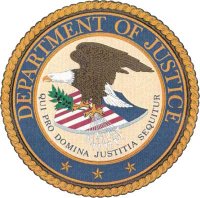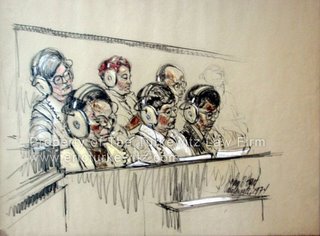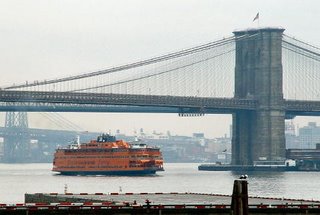The Libby jury was methodical in its analysis and deliberations.
The Smith judge was “blubbering” as he created a media circus.
I’ve never seen a better argument for juries.
March 7th, 2007
The Libby jury was methodical in its analysis and deliberations.
The Smith judge was “blubbering” as he created a media circus.
I’ve never seen a better argument for juries.
March 5th, 2007
 The developing scandal around the firing of U.S. Attorneys around the country, apparently for political reasons since they were all doing good jobs, has just intensified.
The developing scandal around the firing of U.S. Attorneys around the country, apparently for political reasons since they were all doing good jobs, has just intensified.
Michael Battle, Executive Director of the Executive Office for United States Attorneys, has resigned.
(Via American Constitution Society Blog)
It seems inevitable that he will be subpoened to testify about who gave the marching orders for the firings, and what the basis was for those terminations. And if he is no longer working for the Department of Justice, he will be free to speak a bit more candidly than if he were. Which is bad news for the genius who thought firing good people was a good idea.
Update — As per Fox News, Official Resigned “About a Month Ago”. He was apparently unhappy about orders from above that he was to purge the U.S. Attorneys for what appears to be purely political purposes.
see also: U.S. Attorney Imbroglio: The Story That Keeps on Giving (WSJ Blog)
March 1st, 2007
Out of Rio de Janeiro comes this story about a 23 year belly ache, and the forgotten 2″ long scalpel that was found on x-ray that was causing the problem.
I’ve seen cases with retained sponges, clamps and a broken surgical scissor blade, but never a scalpel.
She’s lucky to be alive.
(hat tip to Kevin, M.D.)
February 27th, 2007
 As the Scooter Libby jury deliberates, now with the loss of one very independent minded juror who refused to wear a Valentine’s Day shirt, my thoughts turn to jury nullification and the comments of one New York jurist (and a new blog on the subject):
As the Scooter Libby jury deliberates, now with the loss of one very independent minded juror who refused to wear a Valentine’s Day shirt, my thoughts turn to jury nullification and the comments of one New York jurist (and a new blog on the subject):
Many years ago, I tried a difficult medical malpractice case before Justice Stanley Sklar in New York. When Justice Sklar discharged the jury (we settled during deliberations) he told a story that I remember today:
In the 1600s William Penn was arrested for an “illegal” speech. The jury acquitted Penn, which enraged the colonial judge. So the judge imprisoned the jury for a few days to help “persuade” them to reach a verdict more to his liking. The jury refused and their imprisonment was subsequently overturned. Thus, the power of the jury was established, free of the opinions of the judge. (See: Bushel’s Case)
Juries are supposed to be finders of fact, and apply those facts to the law as given by the judge. But sometimes juries don’t like the law and do what they want. While in civil cases a jury verdict can sometimes be reversed, in criminal cases a defense verdict ends the case for all time. A few quotes to ponder:
The jury has the power to bring a verdict in the teeth of both law and fact. — Oliver Wendell Holmes, United States Supreme Court Justice
The jury has a right to judge both the law as well as the facts in controversy. — John Jay, 1st Chief Justice of the Supreme Court
The pages of history shine on instances of the jury’s exercise of its prerogative to disregard instructions of the judge — U.S. vs. Dougherty, 1972
It would be an absurdity for jurors to be required to accept the judge’s view of the law, against their own opinion, judgment, and conscience. — John Adams
For more on jury nullification, I found a brand new blog on juries from trial lawyer and jury consultant Anne Reed and her blog entry: The Rare Ruby-Throated Jury Nullification
Links to this post:
jury duty stamps — get ’em while they’re hot!!
cross-posted from new york personal injury law blog: credit new york chief judge judith kaye for the idea. last week the united states postal service unveiled, at the new york county courthouse where i picked my first jury and tried my …posted by Eric Turkewitz @ September 19, 2007 11:04 AM
February 26th, 2007
 From an AP story today…
From an AP story today…
(AP) A federal judge on Monday denied the city’s request to limit the amount of damages from the Staten Island ferry crash that killed 11 people and injured dozens in one of the worst mass-transit disasters in city history.
The city had sought to cap civil claims to a total of $14.4 million — the value of the vessel Andrew J. Barberi — citing a 19th century maritime statute. Scores of plaintiffs have sued the city for damages that lawyers say could reach billions of dollars.
The Barberi slammed into a concrete pier on Oct. 15, 2003 after pilot Richard Smith, suffering from extreme fatigue and on painkillers, passed out at the helm. In a guilty plea in 2005, ferry director Patrick Ryan, the top-ranking city official charged in crash, admitted he failed to implement or enforce a rule requiring two pilots during docking.
So why did the judge refuse the city’s request? According to U.S. Eastern District Judge Edward Korman sitting in Brooklyn:
The city’s failure to provide a second pilot or otherwise adopt a reasonable practice that addresses the issue of pilot incapacitation was plainly a substantial factor in causing the disaster…Because this negligence is directly attributable to its director of ferry operations, the city cannot limit its liability to the value of the Barberi. (page 21 of decision)